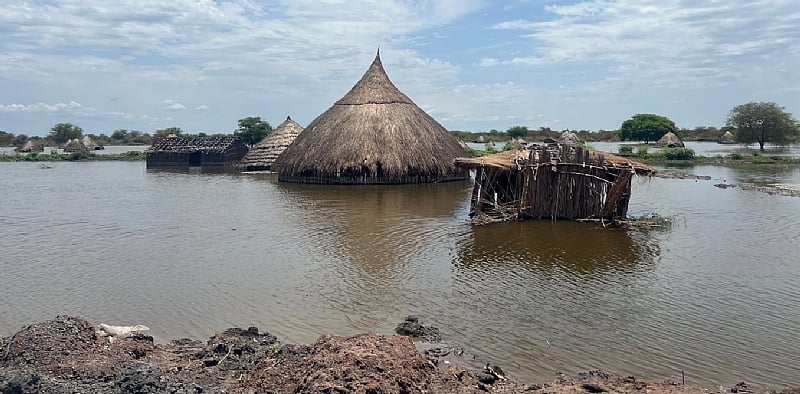Africa has begun experiencing frequent extreme weather events. Extreme weather is defined as the kind of heatwaves, droughts, storms and floods that have historically been rare occurrences for the place and time, and which pose a danger to large numbers of people and the economy. Marina Joubert researches how the public connects with science. She was part of a multidisciplinary team who investigated how people in 68 countries understand the connection of extreme weather with climate change.
Do people believe that extreme weather is caused by climate change?
We conducted this research because extreme weather events are becoming more frequent and intense due to climate change. Yet we have minimal information about how these events influence people’s views on climate change and their support for climate change policies.
We used data that measured how many people around the world have been exposed to extreme weather events – like floods, heatwaves, storms, droughts, wildfires – in recent decades. We combined this with the views of almost 72,000 people in 68 countries who reported whether they had experienced extreme weather, if they thought this was due to climate change, and how much they supported five major climate policies.
More than 7,000 people took part from 12 African countries (Botswana, Cameroon, Côte d’Ivoire, Democratic Republic of Congo, Egypt, Ethiopia, Ghana, Kenya, Morocco, Nigeria, South Africa and Uganda).
Our findings show that many people believe that recent extreme weather events are caused by climate change. However, this varies by event type and region. We did not measure public acceptance of the scientific evidence or general belief that human activities cause climate change. Instead, we measured whether individuals believe a specific recent event they experienced (like a heatwave or flood) was caused by climate change.
We call this belief “subjective attribution”.
Our research found this was generally high, particularly in Latin America, where people were most likely to report that climate change would harm them and future generations. They agreed that climate change should be a top priority for their governments.
Accepting a link between climate change and extreme weather events was lower in the African countries we studied.
This suggests that even though Africa is very vulnerable to climate risks, public awareness of climate change effects remains low. Many people in these 12 African countries do not fully accept the connection between climate change and extreme weather events.
Were people who had experienced climate disasters more likely to support climate policies?
This relationship is intricate. Surprisingly, just experiencing a flood or drought isn’t enough. It’s the perception that climate change is responsible for the event that truly drives action.
In other words, merely being exposed to extreme weather events does not automatically lead to support for climate policies.
However, individuals who experienced extreme events and acknowledged that these events were caused by climate change were more likely to support such policies. For example: people exposed to wildfires were more supportive of climate policies. In contrast, exposure to heavy rainfall was linked to lower support, likely because people generally don’t associate heavy rain with climate change. In other words, attribution matters more than exposure.
Which climate policies did you study and which were most popular in Africa?
Climate policies are designed by governments to help mitigate or combat climate change. A good example is reducing greenhouse gas emissions.
Our study set out to measure the support for five potential climate mitigation policies. These were:
Increasing taxes on foods like beef or dairy that are carbon intensive (give off a lot of greenhouse gases when they are produced).
Raising taxes on fossil fuels, like coal and gas, that damage the environment when they are burnt.
Expanding infrastructure for public transportation, so that there are fewer private cars on the road.
Increasing the use of sustainable energy, such as wind and solar power.
Protecting forests and natural land areas.
The most popular policies worldwide (African countries included) were protecting forests and land. This had 82% global support. The second most popular policy, with 75% global support, was increasing the use of renewable energy.
People were much less in favour of carbon taxes on food and fuel (22% and 29% support, respectively).
This is possibly because people see protected natural areas and green energy as positive, future-oriented solutions. Carbon taxes may be viewed as punitive, especially in regions with high poverty and inequality.
What needs to happen next?
Our findings highlight the importance of public engagement on climate change. Especially in Africa, this will be a crucial step towards getting the public to support stronger climate policies. African governments must encourage public buy-in for their implementation and enactment.
If we want more public backing for solutions like clean energy, forest protection, and sustainable transport, we must help people connect what they feel with what science shows us. This is where climate communication is important. Scientists, educators, journalists and civil society all have roles in explaining the “why” behind the weather.
Active communication and engagement can help people realise that climate change is already affecting their lives through floods, droughts, heatwaves, and more.
Simply providing factual knowledge is not enough, because people interpret this information based on their previous views, values and experiences. It is essential to take note of public opinion.
The benefits and advantages of climate policies, such as better air quality, more affordable solar power, or improved public transport, must be communicated in a clear and relatable way.
Extreme weather events are “teachable moments”: opportunities to explain climate change to the public and to have deliberate societal conversations around climate experiences and impacts.
Marina Joubert does not work for, consult, own shares in or receive funding from any company or organisation that would benefit from this article, and has disclosed no relevant affiliations beyond their academic appointment.
By Marina Joubert, Science Communication Researcher, Stellenbosch University


